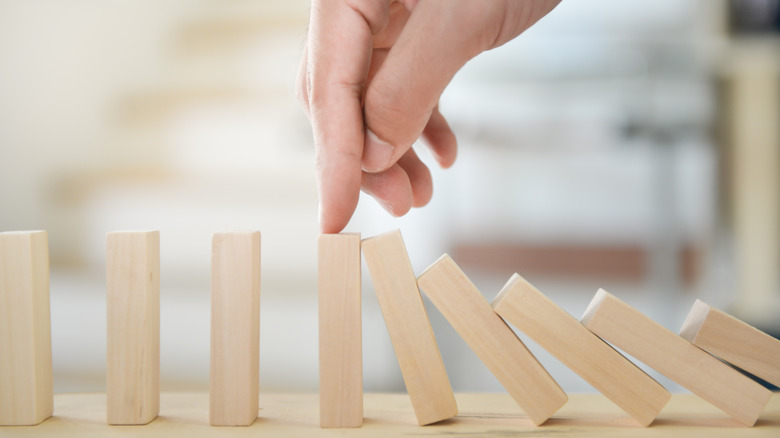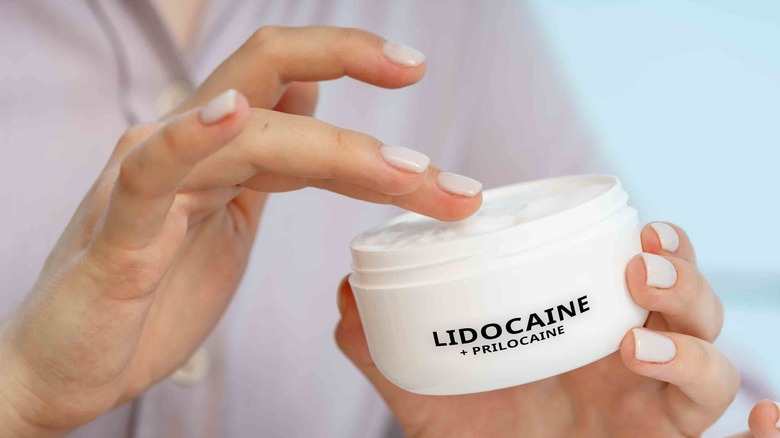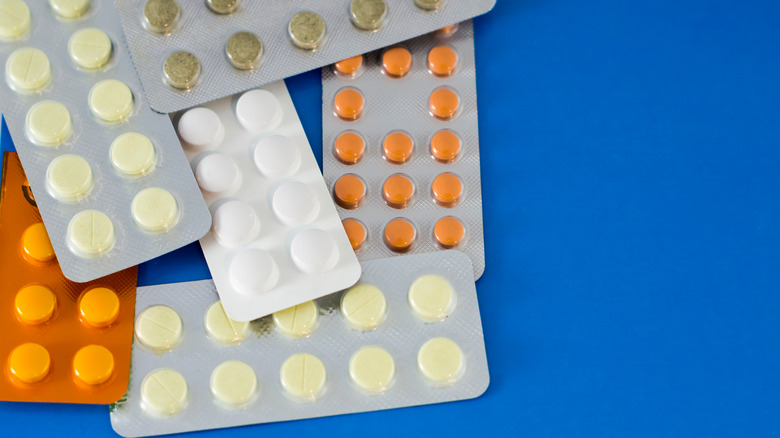Clever Tricks To Last Longer During Sex (And The Benefits Of Each)
While people often believe that all men think about is sex, most don't realize that, in some cases — or in one out of three sexually active men in the U.S., to be precise — their thoughts about sex carry unwanted feelings of stress or anxiety with them, all thanks to one of the most common sexual concerns among men, premature ejaculation (PE). Ejaculation is the moment when semen is released through the penis, often accompanied by an orgasm or climax, after sexual stimulation. However, when it comes to PE, ejaculation is characterized by happening too quickly, usually between the first three minutes of sexual intercourse, leading to potentially unsatisfactory experiences for the parties involved and feelings such as frustration, embarrassment, and lowered sexual confidence for many men (via the Urology Cafe Foundation).
Nevertheless, not all is lost when it comes to PE, seeing that there are various treatment options depending on its cause (which can be either physical or emotional) as well as tips and tricks to help you last longer (per Healthline). This article covers some clever ways to prolong sexual performance and enhance satisfaction for people with PE and their partners, each backed by potential benefits that go beyond merely extending the duration of sex. From behavioral techniques to creams, special condoms, or lifestyle adjustments, the following strategies might help men regain control, boost their confidence, and improve their overall sexual experience while fostering a more fulfilling and intimate connection with their partner.
Try the squeeze technique
The squeeze technique, also known as the stop-and-squeeze method, is a simple way of stopping an ejaculation that involves applying gentle pressure to the penis just before you feel an orgasm coming. The pressure is typically applied to the frenulum, the area where the head of the penis (aka the glans) meets the shaft, by placing the thumb and forefinger on opposite sides and using them to squeeze firmly for five seconds, but not too hard to the point it hurts. Then, wait 30 seconds before going back to where you left off. This action temporarily reduces the sensation of impending orgasm, delaying ejaculation and allowing you to continue sexual activity without finishing too soon (via Proactive Men's Medical Center).
The reason the squeeze technique works is that it temporarily reduces stimulation as well as blood flow to the penis, thus interrupting any ejaculation attempts (per DoctorNDTV). Plus, it also helps by resetting the level of arousal, allowing men to last longer. When it comes to the technique's added benefits, aside from being free and safe, it can also boost confidence by helping men become more attuned to their arousal levels, which may foster a greater sense of control. Additionally, since you can do it yourself or ask your partner to participate by doing it for you, it can help enhance communication between couples and encourage partners to work together towards an improved sexual experience.
Do some Kegel exercises
You've most likely heard about kegel exercises and their numerous benefits for women's sexual and reproductive health. If that's the case, you might be surprised to learn that they also offer quite a number of benefits for men's health, including sexual health. Kegel exercises are known for their effect on strengthening the pelvic floor muscles, the ones that stretch from your tailbone to your pubic bone to hold your bladder and bowels (and the reproductive organs in women). Due to the role these muscles play in ejaculation, they are starting to become another strategy for PE management (via Medical News Today (MNT)).
According to an article published in Sexual Medicine Reviews, while advances in the use of kegel exercises for PE are still in their early stages, pelvic floor muscles in men, namely the superficial ones, seem to help coordinate ejaculation. Therefore, by gaining control over them, you might inhibit the ejaculatory reflex, resulting in longer-lasting sexual encounters and greater sexual satisfaction. Plus, aside from being an accessible treatment option, they also help achieve erections and prevent fecal and urinary incontinence (via MNT). Kegel exercises are performed by contracting the pelvic floor muscles for a few seconds before relaxing, as you'd do if you were trying to stop the flow of urine mid-stream. You can do sets of 10 to 20 exercises thrice daily (via Healthline). Per the article, with time and practice, you could even stop to contract the muscles during sex, creating what scientists call an "internal squeeze" that wouldn't need manual pressure.
Give edging a try
According to a review published in Medical Sciences, like the squeeze technique, edging is a psychosexual behavioral method used to delay ejaculation. Like most of these methods, the concept is a simple one, albeit one that requires repetition to master. In short, edging involves bringing yourself (or being brought) close to the point of ejaculation or "the edge," hence the name. Then, pausing all stimulation until you feel the urge slip away before starting again. According to MNT, the process can be repeated multiple times before finally allowing an orgasm to happen, allowing you to increase the duration of sex while helping build tolerance to the sensations that lead to ejaculation.
As you can imagine, the benefits of edging go beyond just delaying ejaculation and lasting longer. Per the International Society for Sexual Medicine, it can also lead to more intense and satisfying orgasms, as the repeated buildup of arousal can heighten the eventual climax. Additionally, edging can improve sexual communication between partners, as it often requires cooperation and mutual understanding to successfully navigate the pauses and changes in stimulation (via MNT). This can lead to a more connected and fulfilling sexual experience for the people involved.
Apply numbing creams or sprays
Since PE is often tied to sensations during sex, it is no surprise that using topical or local anesthetic agents, like numbing creams or sprays, is another way to handle it. According to a review published in Cureus, these numbing agents work by temporarily desensitizing the head of the penis, thus prolonging how long it takes to climax. Per another review published in the International Journal of Reproductive Biomedicine, active ingredients like lidocaine and pilocarpine are some of the key elements behind the desensitizing effect. The review explains that applying numbing agents 20 minutes before having sex may increase intravaginal ejaculation latency time (IELT) from a little over one minute to almost nine minutes. IELT is an important factor in diagnosing and treating PE that measures how long a man can last during sex with a woman before ejaculating.
Despite being a quick solution for PE, anesthetic agents may cause some unwanted side effects. For example, the second review explains that by reducing sensitivity in the area (and thus, the amount of pleasure felt), numbing creams and sprays may even interfere with erections. In addition, if they're not adequately washed off before intercourse, they may rub off on your partner, causing the same numbness that might also hinder their pleasure and climax. To keep any of this from happening, it is best to use these agents for no longer than 30 minutes and wash them off five to 10 minutes before sex (via the Urology Cafe Foundation).
Try precoital masturbation
As its name suggests, precoital masturbation aims to manage PE by allowing a first orgasm to happen (whether solo or not) before giving it a second and, theoretically, longer shot. It is a technique that takes advantage of the body's natural refractory period, which is the time after an orgasm when men can't get another erection or are just not into sex for a while before they can become aroused and ejaculate again (via MNT). Thus, the idea behind this trick is that by ejaculating once beforehand, you might delay it the second time during sex because it will take you longer to climax, allowing for a more prolonged sexual activity (per the National Library of Medicine (NLM)).
In fact, according to a study published in The Journal of Sexual Medicine, people with PE who had sex more than once per day had a longer IELT the second time around. However, MNT warns against one potential caveat: the length of the refractory period. For some people, it may last just a few minutes, meaning you and your partner won't have to wait long to go for it again. Yet, for others, it may last hours or even over a day, which may put a damper on your sex life. While it is not understood what influences this time gap, one thing is for sure: since sexual performance declines with age, the refractory period may only take longer as the years go by. Thus, the NLM suggests practicing precoital masturbation one hour before the second try, highlighting the importance of experimenting with different time intervals to find what works best for you.
Ask your doctor for medication
Medication can be an effective treatment option for PE, with several drugs used off-label to help manage this condition. This means that drugs developed and approved for something else entirely have proven beneficial for other purposes as well. In the case of PE, a review published in the International Journal of Reproductive Biomedicine lists multiple antidepressants among the best contenders. At the same time, the NLM states that among them, selective serotonin reuptake inhibitors (SSRIs) like sertraline, fluoxetine, and paroxetine are considered first-line treatment options.
According to the review, SSRIs work by increasing the levels of serotonin in the brain, a neurotransmitter that plays a key role in mood regulation but also inhibits ejaculation. Therefore, by boosting serotonin levels, these drugs can help men gain better control over when they ejaculate, often prolonging the time it takes to reach climax. However, while the drugs are generally well-tolerated and their effectiveness can be seen within a few days to weeks of starting treatment, they need to be taken daily and are not without potential side effects, which might include the inability to climax, reduced sexual desire, and erectile dysfunction (via the NLM). Thus, consulting with a healthcare provider before starting any medication is vital, as they may guide you regarding the choice of drug and dosage, considering your individual preferences and factors.
Get some thickened condoms
One common opinion regarding the use of condoms is that it just doesn't feel the same. Well, in this case, this is precisely what thickened condoms are designed for. According to a study published in Translational Andrology and Urology, these types of condoms, which have a thickness equivalent to three regular condoms, are a practical solution for PE by acting as a physical barrier that reduces sensitivity during sex. By dulling sensations, they delay ejaculation, allowing men to last longer.
However, that's not all. Per the NLM, these special latex condoms offer several additional benefits. For starters, they seem to help prolong erection time and rigidity and the intensity of orgasms for men, all without the need for medication or complex techniques, making them a more straightforward option for PE management. In addition, like all condoms, thickened condoms provide essential protection against sexually transmitted infections (STIs) and unwanted pregnancies, making them a dual-purpose solution for safer and longer-lasting sex. Lastly, the study points out that, unlike medication, these condoms don't create dependency. However, it also states that they may cause slight discomfort during sex, which can be easily solved by the use of lubricants.
Keep a healthy weight
According to a study published in the International Journal of Impotence Research, there is a clear link between some metabolic syndrome (MetS) components and PE. MetS is a diagnosis that signals that a set of conditions are happening together, increasing the risk of heart disease, stroke, and type 2 diabetes (via the American Heart Association (AHA)). These conditions, also known as components, include high blood pressure, high blood sugar, excess visceral fat or fat around the waist, high triglyceride levels, and low HDL (good) cholesterol levels. Having just one of these conditions doesn't equal MetS, but having three or more does, which increases the risk of serious health problems.
Although the reason why MetS and PE are linked is not clear, another study published in The World Journal of Men's Health found that having MetS increased the likelihood of developing PE twofold. Per the study, there are numerous potential causes, including the increased risk of depression in people with MetS, which in turn may trigger or exacerbate PE. Another theory suggests that MetS negatively affects the role of serotonin in the brain, a key factor in the regulation of ejaculation and the main organic cause of PE. Lastly, MetS can lead to tissue inflammation, contributing to PE when affecting tissues involved in the ejaculation process. Thus, since keeping a healthy weight is one way to reduce your risk of MetS and other chronic diseases, doing so might help lower the risk of PE while also improving your quality of life.
Make time for exercise
You probably already know that working out has numerous health benefits, but did you know it may also be an effective way to manage PE? Well, according to an article published in Sexual Medicine Reviews, whether you favor the freedom of running, the calming effects of yoga, or prefer the rush of high-intensity interval training (HIIT), regular physical activity might be just as effective in helping you last longer during sex as some medications. For example, one study published in the Urology Journal found that men who engaged in regular physical activity had a longer IELT compared to those who were sedentary. Specifically, the study discovered that sedentary men had an IELT of about three minutes, while men who worked out had an IELT of about five minutes.
A study published in Andrologia suggests that the connection between physical activity and PE may be due to the impact of exercise on serotonin levels in the brain. Dysfunction in serotonin receptors is a known factor contributing to PE, while exercise is known to boost serotonin levels (via the American Psychological Association (APA)). Thus, by making time for exercise, you'd be killing two birds with one stone: improving your mental health and your sex life by helping delay ejaculation. In fact, this last study found that working out for more than 30 minutes five or more times a week had comparable results in delaying ejaculation as the drug dapoxetine, a common off-label medication for PE.
Try biofeedback therapy
Biofeedback therapy is a valuable tool for men seeking to manage PE. This type of therapy is a technique that uses electrical pads to teach you how to control certain bodily functions, including heart rate, muscle tension, and breathing patterns (via the Mayo Clinic). In the context of PE, the focus involves monitoring and changing the previously mentioned bodily functions, which happen to play a role in sexual arousal and the timing of ejaculation. Thus, the concept is that by learning how to regulate them, you could gain better control over your body's responses during sexual activity and potentially delay ejaculation, leading to longer-lasting and more satisfying sexual experiences.
However, research suggests that biofeedback therapy might offer better results when paired with other treatment options, such as medications. For example, a study published in International Urology and Nephrology found that after three months of biofeedback-guided pelvic floor exercise therapy, those who only relied on biofeedback had an IELT of just over two minutes, while those who combined it with the SSRI dapoxetine had an IELT of more than three minutes. Beyond its potential to delay ejaculation, biofeedback therapy offers additional benefits, including reducing stress and anxiety, chronic pain management, and improving focus and concentration, to mention a few (via the Cleveland Clinic).
Ask about adult circumcision
Adult circumcision is a surgical procedure that involves the removal of the foreskin from the penis, and according to research, it may help men prolong ejaculation and enhance sexual satisfaction. For instance, after the participants of a study published in Biochemistry Research International confirmed said effects, the study implied that this might be due to the impact of the procedure on pudendal-evoked potential latency, which is the time it takes for nerve signals to travel from the genital area to the brain. By prolonging the latency of these signals, circumcision may delay the onset of ejaculation.
According to another study published in BJU International, circumcision may cause those nerve signals to take longer to register because of the loss of sensitivity that happens once the foreskin is removed, resulting in a longer time to reach the point of ejaculation. However, while the previous study reported beneficial effects of adult circumcision on sexual satisfaction, as well as in preventing conditions such as urinary tract infections and penile cancer, the following study noted that some participants actually reported reduced sexual fulfillment, characterized by having trouble climaxing, a lower orgasm intensity, or even uncomfortable sensations, such as numbness, itching, or prickling.












